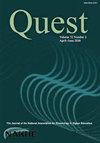残疾模拟在适应性体育活动课程中的设计与实现——来自教师的报告
IF 1.7
3区 教育学
Q2 EDUCATION & EDUCATIONAL RESEARCH
引用次数: 0
摘要
本文章由计算机程序翻译,如有差异,请以英文原文为准。
Disability Simulation Design and Implementation in Adapted Physical Activity Coursework – Reports from Faculty
ABSTRACT Despite wide use in adapted physical activity (APA) courses, disability simulations are heavily critiqued for not being culturally responsive and for perpetuating negative stigmas. The present study explored the extent to which critiques have been addressed. Specifically, we aimed to appraise the design of disability simulations. A convenience sample of 14 APA instructors were surveyed and 8 opted-in for follow-up, semi-structured interviews. Adopting a pragmatic, interpretivist lens, we critically evaluated course artifacts and instructors’ descriptions of their assignments. Four assignment types were identified: evaluating accessibility of facilities, experiencing adaptations for activities of daily living, participating in disability sport, and practicing effective teaching modifications. While instructors agreed on a general definition of disability simulations, they were often hesitant to identify their assignments as such, especially disability sport-types. As teacher-researchers, who ourselves employ disability simulations in our courses, we confronted this ambiguity to explore implications for our teaching practices.
求助全文
通过发布文献求助,成功后即可免费获取论文全文。
去求助
来源期刊

Quest
社会科学-运动科学
CiteScore
4.50
自引率
14.30%
发文量
16
期刊介绍:
Quest is the official journal of the National Association for Kinesiology in Higher Education (NAKHE). It is the leading journal for interdisciplinary scholarship for professionals in kinesiology in higher education. Quest provides a public forum for scholarship, creative thought, and research relevant to a broad range of interests held by faculty and leaders in higher education today.
Quest publishes: 1) manuscripts that address issues and concerns relevant and meaningful to the field of kinesiology; 2) original research reports that address empirical questions that are contextualized within higher education and hold significance to a broad range of faculty and administrators in kinesiology; and 3) reviews of literature and/or research of interest to one or more sub-disciplines in kinesiology. Quest does not publish papers focused on sport (e.g., amateur, collegiate, professional) that are contextualized outside of kinesiology in higher education.
 求助内容:
求助内容: 应助结果提醒方式:
应助结果提醒方式:


